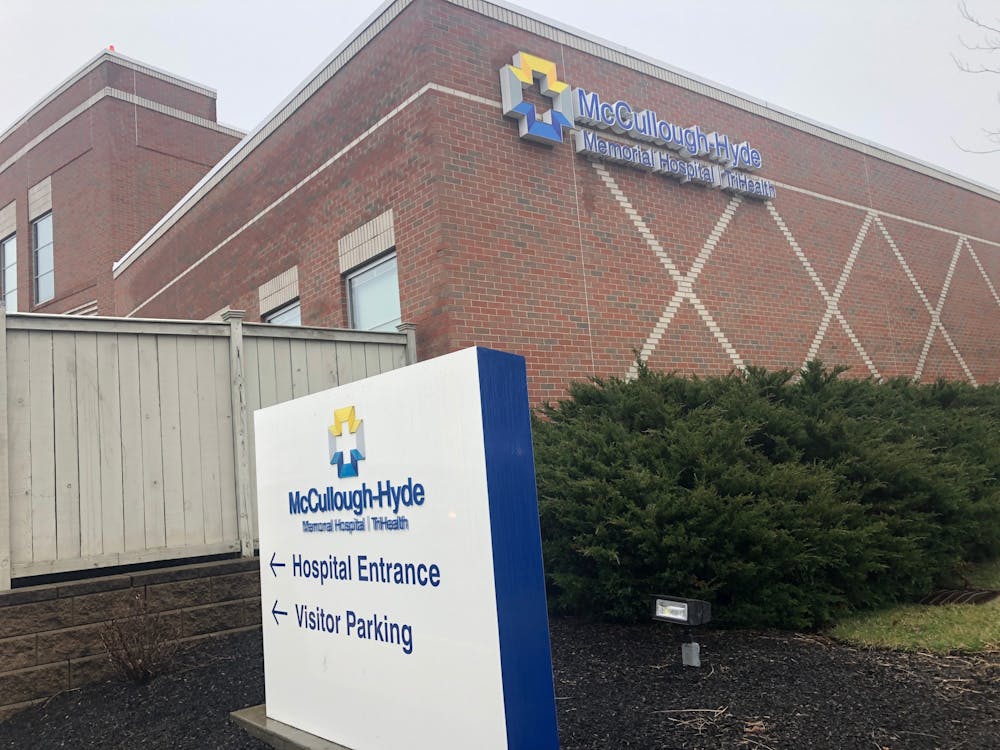McCullough-Hyde Memorial Hospital’s intensive care unit (ICU), which contains four beds, is working at 50% capacity, as of Jan. 26, said Michael Everett, president and chief operating officer of TriHealth. That number has dropped from its previous 100% capacity rate last week.
Currently, there are six active patients with COVID-19 at McCullough-Hyde.
Everett said there is a rolling TriHealth 14-day positivity rate of 37% for Oxford.
Following Everett’s report of COVID-19 statistics on Jan. 4, the Oxford City Council discussed passing the Emergency Face Covering Ordinance, which would require face coverings inside any public space within Oxford, to reduce the spread of COVID-19.
During the meeting, Councilor David Prytherch said the statistics demonstrated the importance of acting on reducing the transmission of COVID-19.
“We’ve got a major wave of infections. Not only is it disruptive to our hospitals, we’re going to have staffing problems. This is going to be economically really harmful,” Prytherch said. “I see a lot of health safety and general welfare justification for doing something.”
Prytherch believes the Emergency Face Covering Ordinance may help lighten the load of McCullough-Hyde.
“What I heard from McCullough-Hyde is we’re in a situation that is a stress on our medical system right now,” Prytherch said. “To not act might be to abdicate responsibility, and I want to do anything as a council. [An emergency face covering ordinance] is an imperfect measure … but if it makes some difference and keeps some people out of McCullough-Hyde, and keeps some people at work, and keeps our kids in school, I think it’s worth it.”
To help combat the overflow of patients, Everett said hospitals in the TriHealth system have been using system calls. These calls help balance the patient loads between hospitals.
“With our affiliations and being part of the TriHealth system,” Everett said, “we’re part of a large health system – that opens up beds if we need them to move patients between the hospitals if one hospital gets to the point where they don’t have the capacity, so we’re never really out of an ICU bed per se right now.”
System calls are typically done on a daily basis, with additional calls being implemented depending on how busy a hospital within the TriHealth system is. During these calls, health officials ask other hospitals if they have open beds available for them to move their patients to.
Due to the present surge in cases, TriHealth hospitals are doing system calls twice a day — one at 6:30 a.m. and another at 6:30 p.m.
Enjoy what you're reading?
Signup for our newsletter
Everett noted that most of the hospital bed requests are not from the ICU but rather medical surgery beds.
“It doesn’t necessarily mean that all of the patients need to be hospitalized,” Everett said. “Most times, they are given whatever medications depending on their conditions, they’re given different treatments.”
Besides system calls, TriHealth has opened up their urgent care and made use of drive-through testing for COVID-19 to limit overloading the ICU units within its hospitals. To access a test, residents can go to the front office or the urgent care department of their local TriHealth hospital.
Increased access to COVID-19 tests in Ohio might be possible in the future as Ohio deploys the National Guard to increase COVID-19 testing locations.
Everett said the Ohio National Guard would make the biggest difference by doing so in the most populous surrounding communities. He said he does not believe Oxford needs the National Guard’s assistance yet.
“Between the urgent care and the drive-through testing and our emergency department, we’ve got a lot of testing set up,” Everett said. “I know we do testing as well in Miami University, so there’s a lot of areas set up for that testing so I don’t really ever foresee us needing them in Oxford to help with testing because that part is well-staffed.”
However, he said Oxford will need the Ohio National Guard’s assistance if the hospital runs out of resources and can no longer provide testing and care.
Currently, Everett does not know if COVID-19 tests provided through the drive-through system will be free.
“We’ve not turned anyone away,” Everett said. “Whatever that insurance piece is, I try not to get into that part. We have a whole other cycle for that.”
Overall, Everett wants to be clear that Oxford is capable of handling the spike in cases.
“Given that we’re a part of TriHealth and a large system, and we’ve actively managed this now for the last two years, we’ve got a playbook,” Everett said. “We know what to do, we’ve refined it, and we’ve got good resilience.”




